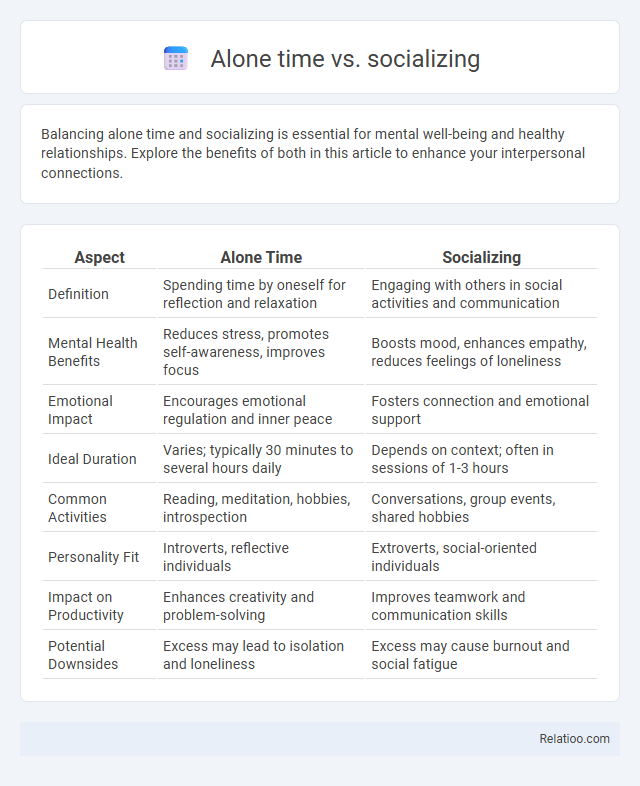Balancing alone time and socializing is essential for mental well-being and healthy relationships. Explore the benefits of both in this article to enhance your interpersonal connections.
Table of Comparison
| Aspect | Alone Time | Socializing |
|---|---|---|
| Definition | Spending time by oneself for reflection and relaxation | Engaging with others in social activities and communication |
| Mental Health Benefits | Reduces stress, promotes self-awareness, improves focus | Boosts mood, enhances empathy, reduces feelings of loneliness |
| Emotional Impact | Encourages emotional regulation and inner peace | Fosters connection and emotional support |
| Ideal Duration | Varies; typically 30 minutes to several hours daily | Depends on context; often in sessions of 1-3 hours |
| Common Activities | Reading, meditation, hobbies, introspection | Conversations, group events, shared hobbies |
| Personality Fit | Introverts, reflective individuals | Extroverts, social-oriented individuals |
| Impact on Productivity | Enhances creativity and problem-solving | Improves teamwork and communication skills |
| Potential Downsides | Excess may lead to isolation and loneliness | Excess may cause burnout and social fatigue |
Understanding Alone Time and Socializing
Understanding alone time involves recognizing its role in recharging mental energy, enhancing self-awareness, and fostering creativity. Socializing contributes to emotional well-being by building relationships, improving communication skills, and providing support networks. Balancing both alone time and social interactions leads to optimal psychological health and personal growth.
Psychological Benefits of Solitude
Solitude offers significant psychological benefits, including enhanced self-awareness, reduced stress levels, and improved emotional regulation. Engaging in alone time fosters creativity and introspection, allowing individuals to process thoughts without external distractions. Studies show that balanced solitude contributes to mental resilience, making it a valuable complement to social interaction for overall well-being.
Social Interaction and Mental Health
Social interaction plays a crucial role in mental health by providing emotional support, reducing stress, and enhancing cognitive function through meaningful connections. While alone time allows for self-reflection and mental rejuvenation, balanced socializing helps maintain a sense of belonging and combats feelings of loneliness and depression. Your mental well-being benefits most when you integrate regular social activities with periods of solitude to foster emotional resilience and overall happiness.
Balancing Alone Time and Social Life
Balancing alone time and social life is essential for maintaining mental well-being and personal growth. Prioritize your alone time to recharge and reflect while engaging in meaningful social interactions to foster connections and support networks. Striking the right balance empowers you to enjoy solitude without sacrificing fulfilling relationships.
Introverts vs Extroverts: Needs and Preferences
Introverts typically recharge during alone time, valuing solitude to regain energy and reflect, while extroverts thrive on socializing, drawing stimulation and motivation from interacting with others. Understanding your personality helps balance these needs effectively, ensuring mental well-being by aligning activities with your natural preferences. Tailoring time spent alone or with others supports productivity and emotional health based on whether you lean toward introversion or extroversion.
Productivity: Working Alone vs Collaborating
Working alone enhances focus and minimizes distractions, leading to higher individual productivity and efficient task completion. Socializing fosters idea exchange, creativity, and problem-solving through collaboration, boosting innovation and diverse perspectives. Balancing alone time for deep work and social interactions for teamwork maximizes overall productivity and project success.
The Impact of Technology on Socialization
The impact of technology on socialization has transformed how individuals balance alone time and social interactions, with digital platforms enabling constant connectivity yet often reducing face-to-face communication. Increased screen time can lead to social isolation despite the appearance of virtual engagement, altering traditional social skills and emotional bonds. Technology facilitates both meaningful connections and distractions, making it essential to navigate digital usage consciously to maintain healthy social relationships and personal solitude.
Recognizing Signs of Isolation and Loneliness
Recognizing signs of isolation includes persistent feelings of emptiness, withdrawal from social activities, and difficulty maintaining relationships, while loneliness is often marked by a subjective sense of disconnection despite being around others. Alone time can be beneficial for mental health and creativity, but excessive solitude might signal underlying emotional distress or social anxiety. Monitoring changes in behavior, mood, and communication patterns is crucial for distinguishing healthy alone time from detrimental isolation and loneliness.
Building Healthy Social Connections
Balancing alone time with socializing is essential for building healthy social connections, as solitude allows for self-reflection and emotional regulation, which strengthens interpersonal relationships. Engaging in meaningful social interactions fosters empathy, communication skills, and emotional support, promoting overall mental well-being. Prioritizing both alone time and social activities helps create a stable foundation for nurturing authentic and resilient social bonds.
Tips for Creating a Balanced Lifestyle
Creating a balanced lifestyle involves integrating alone time and socializing effectively to support mental and emotional well-being. Prioritize setting boundaries by scheduling regular moments for solitude to recharge, alongside engaging in social activities that foster connection and reduce stress. Focus on your personal needs and energy levels to adjust the balance, ensuring your routine promotes both relaxation and meaningful interaction.

Infographic: Alone time vs Socializing
 relatioo.com
relatioo.com